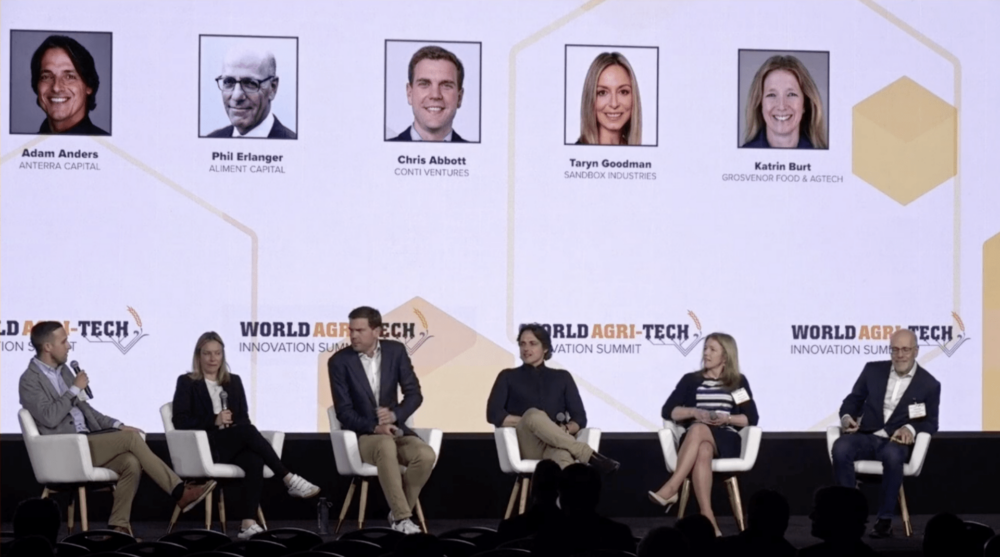[Disclosure: AFN’s parent company is AgFunder.]
At the recent World Agri-Tech Innovation Summit in San Francisco, Cascadia Capital managing director Scott Porter asked a panel of VCs if they thought agrifoodtech investment would improve in the next year, stay the same or get worse.
Unsurprisingly, the majority of panelists (and audience members via a show of hands) said it would get worse.
“People that can avoid the market today are avoiding it,” said Phil Erlanger, founder and managing director at Aliment Capital, in reference to who is investing or trying to raise money in agrifoodtech right now.
The last year has been challenging and in some cases downright terrible for agrifoodtech investment. As AgFunder’s 2023 Global Agrifoodtech Investment report, released last week notes, agrifoodtech investment saw a 44% year-over-year (YoY) drop in funding between 2021 and 2022.
VCs predictions at World Agri-Tech weren’t completely doom and gloom, though.
“The broader macro environment is not going to get any better anytime soon, but I do think it’s a big opportunity as well,” said Katrin Burt, managing partner at Grosvenor Food & Agtech. “For the companies that have strong fundamentals, it’s a real opportunity for them to make acquisitions. For investors, it’s a real opportunity to actually appropriately price the best [startups] in the network.”
“I do think it’s going to get worse,” Taryn Goodman, a partner at Sandbox Sustainability Ventures, added. “But for those companies addressing the right problem and doing it in an economically viable way, there’s plenty of money out there for it.”
Where VCs are looking next

So what are “the right” problems to address?
Adam Anders, managing partner at Anterra Capital, said he was both afraid and optimistic” about the role of antibiotics in our food system.
“I am concerned about what’s happening with bird flu [Avian Influenza] and the role of antibiotics in our food system and the impact on human health. I would love to see more innovation there.”
Burt predicted widespread adoption of obesity drugs, citing recent numbers from the World Obesity Federation that says more than half the world’s population will be classed as obese or overweight by 2035 if action is not taken.
“We’ve got there not because [people] have no willpower but because of the food system. The top 18 food and drink companies around the world: 85% of their products are classed as unhealthy by the World Health Organization. We’ve seen regulation around some of the new types and appetite suppressant drugs which suggests that the opportunity window may be shifting and it will be socially acceptable mainstream.”
Others spoke to a rise in financial-related technologies, a possible heyday for robotics and automation, and the “de-commoditization of crops” as seen, for example, with Benson Hill’s high-nutrient soybeans.
VC predictions from AgFunder report
As part of the 2023 AgFunder Global AgriFoodTech Investment Report, AgFunder polled a range of venture capital investors focused on foodtech and agtech to get their predictions for the year. Below is a selection. (Download the full report to see more.)
Correction in startup valuations
The correction in startup valuations will continue throughout 2023 leading to closures and the consolidation of companies and talent through roll-ups and aqui-hires to market leaders in various categories. Plant-based foods and digital ag tools could be hit hard.
“It will be a year of bust-ups, roll-ups and M&A.” — Antony Yousefian, The First Thirty Ventures
“Lots of investors will keep their money reserved for their own portfolio. Will be difficult for new companies to raise.” — Gideon Soesman, Greensoil Investments

More activity and entrants in carbon
From improved measurement, reporting and verification (MRV) capabilities to premium-priced, low-carbon food products, several respondents mentioned carbon as a key – and continuing – area of focus for investors and innovators:
“We believe the landscape of MRV companies, other facilitators, marketplaces and the carbon economy as a whole could look completely different in the next year or two. Our portfolio company, Bushel, surveyed 1,000 farmers and found that over 60% are interested in participating in a carbon credit program that helps them get paid for soil improvement. Plus, there are many companies with solutions to offer farmers. Yet there are only a handful of MRVcompanies with steep backlogs and still nascent methodologies, requirements and procedures.” — Michael Lavin, Germin8 Ventures
More upstream investment overall
The shift towards upstream innovations was clear in the 2022 data and VCs believe it will continue into 2023, especially in Ag Biotech:
“AI everything! But importantly in ag biotech. While AI predictions for structural biology (e.g., Alphafold) have taken academia and medicine by storm, there is still a lag in agriculture. I expect this to change in 2023.” — Yanniv Dorone, Fall Line Capital
“We expect more funding to go into upstream investments and for Agtech to grow into a more diverse set of products for farmers. In Agtech 2.0, we are big believers that founders have discovered what failed in Agtech 1.0 and will not repeat those same mistakes. We have seen farmers adopting technology at much higher rates than in the Agtech 1.0 era, and we are starting to see more founders coming into the space creating solutions with technology that goes beyond the typical solutions and niche subsegments that we have seen the past few years.” — Stephanie Dorsey, E2JDJ Ventures
Things not to repeat in 2022
“Lots of followers and not many lead investors.” — Sanjeev Krishnan, S2G Ventures
“Founders who did not do their homework and kept doing top down market analysis, focusing only on total addressable market.” — Manuel Gonzalez, AgFunder
“Overconfidence. Ego. Not enough focus on execution and market fit.” — Bernardo Milesy, GLOCAL





